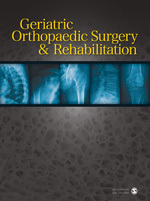Geriatric Orthopaedic Surgery & Rehabilitation
Geriatric Orthopaedic Surgery & Rehabilitation (GOSR) is a specialized field of orthopaedic surgery and rehabilitation medicine that focuses on the care of elderly patients with musculoskeletal issues. This discipline addresses a wide range of conditions, including fractures, joint replacements, degenerative diseases such as osteoarthritis, and soft tissue injuries, all within the context of the unique physiological changes and medical complexities that accompany aging.
Overview[edit | edit source]
As the global population ages, the demand for geriatric orthopaedic care increases. Elderly patients often present with comorbidities such as diabetes mellitus, hypertension, and osteoporosis, which can complicate both surgical and non-surgical treatment approaches. GOSR aims to improve the quality of life for older adults by managing these conditions through a combination of surgical intervention, rehabilitation, and preventive care.
Conditions Treated[edit | edit source]
GOSR encompasses a broad spectrum of conditions, including but not limited to:
- Fractures (especially hip fractures, which are particularly common and serious in the elderly)
- Osteoarthritis and other degenerative joint diseases
- Spinal disorders such as lumbar spinal stenosis
- Soft tissue injuries and conditions, such as rotator cuff tears
Treatment Approaches[edit | edit source]
Treatment in GOSR is highly individualized, taking into account the patient's overall health, functional status, and goals. Treatment strategies may include:
- Orthopaedic surgery, such as joint replacement or fracture repair
- Physical therapy and rehabilitation to restore mobility and strength
- Pain management strategies, including both pharmacologic and non-pharmacologic approaches
- Fall prevention programs to reduce the risk of future injuries
Challenges and Considerations[edit | edit source]
Treating elderly patients requires a comprehensive approach that goes beyond addressing the immediate orthopaedic issue. Considerations include:
- The increased risk of surgical complications and slower recovery times in older adults
- The need for a multidisciplinary approach, involving geriatricians, physical therapists, nutritionists, and other specialists
- The importance of communication and shared decision-making with patients and their families
Future Directions[edit | edit source]
Research in GOSR continues to evolve, with ongoing studies aimed at improving surgical techniques, rehabilitation protocols, and outcomes for elderly patients. Advances in technology, such as minimally invasive surgery and wearable devices for monitoring and rehabilitation, hold promise for enhancing care in this population.
Search WikiMD
Ad.Tired of being Overweight? Try W8MD's physician weight loss program.
Semaglutide (Ozempic / Wegovy and Tirzepatide (Mounjaro / Zepbound) available.
Advertise on WikiMD
|
WikiMD's Wellness Encyclopedia |
| Let Food Be Thy Medicine Medicine Thy Food - Hippocrates |
Translate this page: - East Asian
中文,
日本,
한국어,
South Asian
हिन्दी,
தமிழ்,
తెలుగు,
Urdu,
ಕನ್ನಡ,
Southeast Asian
Indonesian,
Vietnamese,
Thai,
မြန်မာဘာသာ,
বাংলা
European
español,
Deutsch,
français,
Greek,
português do Brasil,
polski,
română,
русский,
Nederlands,
norsk,
svenska,
suomi,
Italian
Middle Eastern & African
عربى,
Turkish,
Persian,
Hebrew,
Afrikaans,
isiZulu,
Kiswahili,
Other
Bulgarian,
Hungarian,
Czech,
Swedish,
മലയാളം,
मराठी,
ਪੰਜਾਬੀ,
ગુજરાતી,
Portuguese,
Ukrainian
Medical Disclaimer: WikiMD is not a substitute for professional medical advice. The information on WikiMD is provided as an information resource only, may be incorrect, outdated or misleading, and is not to be used or relied on for any diagnostic or treatment purposes. Please consult your health care provider before making any healthcare decisions or for guidance about a specific medical condition. WikiMD expressly disclaims responsibility, and shall have no liability, for any damages, loss, injury, or liability whatsoever suffered as a result of your reliance on the information contained in this site. By visiting this site you agree to the foregoing terms and conditions, which may from time to time be changed or supplemented by WikiMD. If you do not agree to the foregoing terms and conditions, you should not enter or use this site. See full disclaimer.
Credits:Most images are courtesy of Wikimedia commons, and templates Wikipedia, licensed under CC BY SA or similar.
Contributors: Prab R. Tumpati, MD

